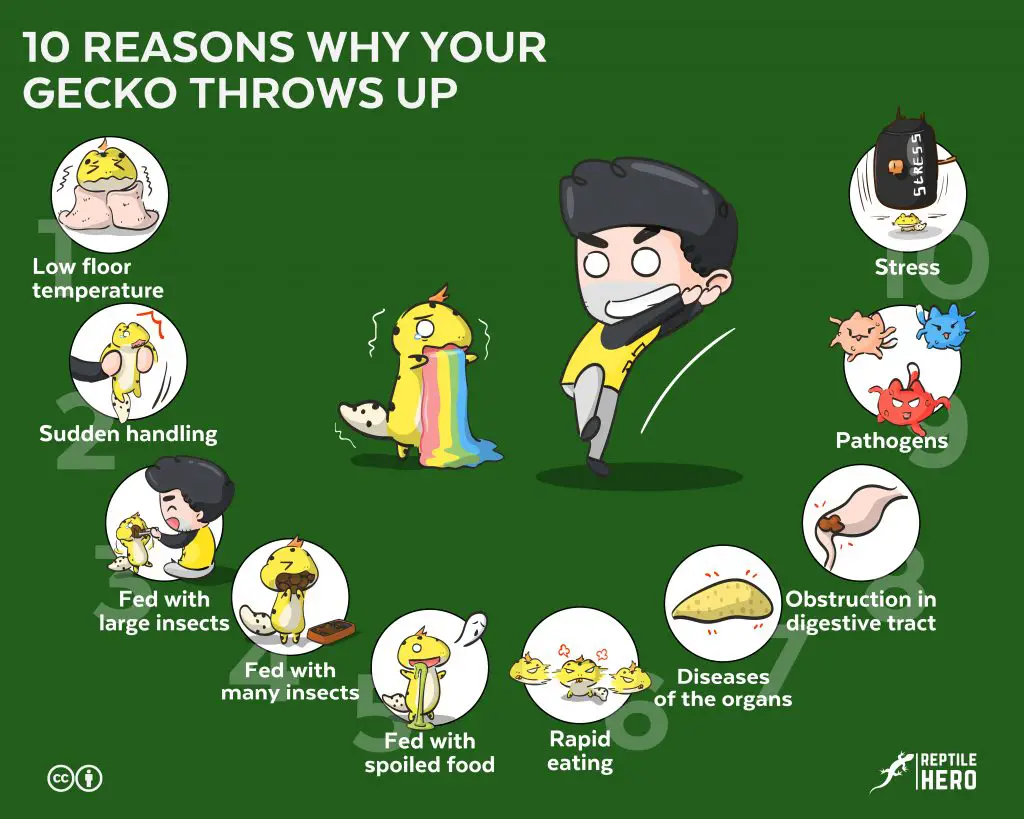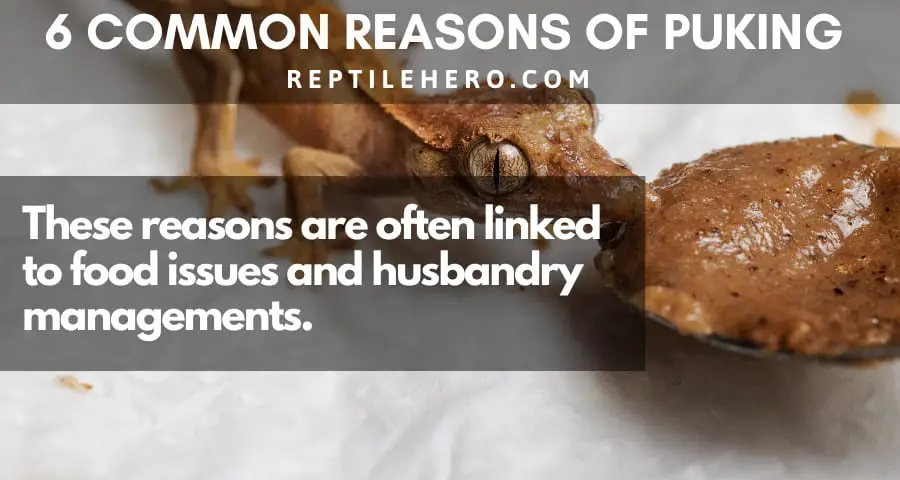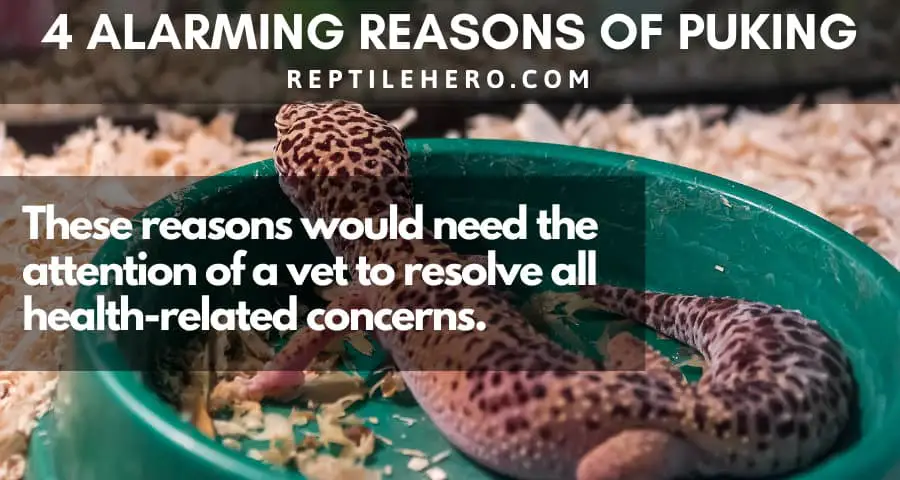Why Is Your Gecko Vomiting? 10 Reasons and Solutions
One of the typical problems that you may encounter as a reptile parent is vomiting. Frequently, it causes an immediate trip to your veterinary clinic. While waiting for your beloved pet’s appointment, here are 10 possible reasons that might come in handy when you discuss the issue with your exotic veterinarian.
Gecko vomits due to low floor temperature, sudden handling, fed with large insects, fed with many insects, feeding with spoiled food, rapid eating, disorders of the organs, obstruction in the digestive tract, pathogens and stress.
Do you want to learn more? Come along as we talk about gecko pukes.

Throw Up: Regurgitate or Vomit?
First of all, let me clarify that there is a distinction between vomiting and regurgitating, and identifying them can make a huge difference for your gecko!
You would often hear the terms “vomit” and “regurgitate” when people talk about puking or throwing up. Most often than not, people use these expressions interchangeably to mean the same thing—the act of forcibly or involuntarily emptying the stomach by the mouth.
However, vomiting is not always vomiting. Sometimes, it could be regurgitation. And these two behaviors do not speak of the same act.
Oftentimes, knowing the difference between the two can help you treat your gecko.
“Vomiting” (scientifically known as “emesis”) is an active process of forcefully expelling solid or liquid matter from the stomach or the upper intestines (lower gastrointestinal tract). Some of the things you may observe when a gecko is vomiting are:
- Vomiting could co-occur with abdominal muscle contractions and gagging.
- Vomiting may also be accompanied by lip-licking, restlessness, and vocal sounds.
- The vomitus—the vomited substance—may contain bile, a greenish liquid.
- The vomitus may also come with some digested food.
“Regurgitation” is usually a passive process of the expulsion of solid or liquid matter from the esophagus and pharynx (upper gastrointestinal tract). A few of the things you may observe when you catch your gecko regurgitating are:
- Regurgitating is not always accompanied by any gecko vocal noises or lip-licking.
- Regurgitating also does not come with gagging or abdominal muscle contractions.
- Regurgitating would make your gecko lower its head until the regurge falls off from the mouth.
- The regurge—the regurgitated substance—is almost always an intact food with or without any liquid.
As a typical reptile owner, you may not find the distinction to be of any significance. However, it could make all the difference for your trusted exotic veterinarian and their medical perspective to provide proper medication.
A little reminder before we proceed.
To be on the same page, we will use the terms “throw up” and “puke” throughout the discussion. However, when the need arises for clarity to distinguish between the two behaviors, “vomit” and “regurgitate” would be utilized accordingly.
6 Common Reasons Why Geckos Throw Up (Not Concerning)
In geckos, throwing up food or water is often not an occurrence that you can overlook. Even though it is slightly typical behavior that many owners have observed, it has many possible underlying reasons that need to be addressed immediately in order to solve the main issue.
Among the most common causes that trigger a gecko to throw up and are not caused by any underlying gecko issues are:
- cold floor temperature
- frequent, sudden handling
- feeding on many insects
- feeding on large insects
- feeding on spoiled food
- eating too fast
#1. Low Floor Temperature
As a gecko owner, one of the must-have knowledge is that reptiles are cold-blooded animals. This means that they 1) cannot maintain a constant body temperature, 2) cannot regulate their body temperature, and 3) obtain substantial heat from their surroundings [1].
Because of this, your gecko needs a stable and correct tank temperature all day and night to carry out necessary biological processes. Since the enclosure’s floor is in close contact with its belly, the tank must have an area with a warm floor (alternately, a basking area) to help it break down its meal.
Not only would this warm floor be readily accessible during the day, but even at night as well since digestion happens after dinner.
Frequently, many gecko owners might have overlooked the need for an appropriate warm floor throughout the day and night. As a result, the absence of a warm floor may cause the gecko to vomit.
| Gecko Species | Preferred Floor Temperature in the Warm Spot |
|---|---|
| Leopard Geckos | between 90°F and 95°F |
| Crested Geckos | between 80°F and 85°F |
Vomit or Regurgitation?
Throwing up, in this case, is vomiting because the process involves the food item inside the gecko’s stomach. For instance, given that your gecko had a meal for dinner, the food would typically undergo the breaking down processes throughout the night while it stays on the warm floor.
However, if you fail to provide an appropriate area with a warm floor, your gecko cannot carry out the relevant processes. So, there is a chance that the food item would stay in its stomach all night and eventually rot.
When this happens, it can quickly become a medium for opportunistic bacterial growth, causing further complications.
As a result, your gecko’s stomach would expel the food item out of its mouth to protect the body from unwanted bacterial invasion.
How to Solve This Problem?
Whether the gecko vomits during the day or at night, its enclosure must be equipped with proper heating and monitoring devices to prevent vomiting from happening again.
Some of the heating devices you can employ in your gecko’s tank are:
- heat pads (heat mats and under tank heaters)
- radiant heaters (ceramic heat emitters, deep heat projectors, and halogen lamps)
Depending on who you ask, you would get different answers from different gecko owners because of their different experiences. So, when choosing the type of heating device, it is best to pick the one you think would be the most appropriate and would work best for your tank’s setup.
You also have to keep in mind to pair the heating device with a thermostat to control and sustain a stable temperature. Additionally, you have to install a calibrated thermometer to accurately monitor the heat, so the enclosure would not get too hot.
#2. Handling Too Soon
Has your gecko thrown up food or water on you while you are handling it? You are not alone. Many gecko owners share the same experience when holding their reptiles right after eating their meal or drinking water.
Handling geckos too much and too soon after their meals is not an uncommon reason for throwing up. The geckos’ behavior of throwing up when held too quickly is an inherent instinct passed on by their wild ancestors.
In nature, wild geckos frequently stay in a warm and secluded spot after eating their meals.
This behavioral pattern would continue to last for more than a couple of days, where they would rest and digest the meal. Often, they will even refrain from doing any taxing physical activities like hunting and mating.
In captivity, when you immediately hold your gecko after it has eaten, it may see you as a potential predator. As a result, it would want to vacate its full stomach and puke the food item. In this way, with an empty stomach, it would become lighter and faster.
Thus, it can then decide whether it would easily escape your grasp or fight back.
Vomit or Regurgitation?
Geckos can either vomit or regurgitate the food item depending on how early they are held. However, there are no simple rules to keep in mind as many other factors like the individual geckos (age, health, and species), feeding intervals, and the type of food come into play.
Not much is known regarding this matter in gecko species. However, in a study conducted by Koelle and Reese on leopard geckos, they have found that [2]
- Feeders remain in the esophagus for up to 15 minutes.
- Pinkies remain in the stomach for up to 49 hours.
- Mealworms remain in the stomach for up to 52 hours.
Although the research was limited to leopard geckos, you can use this as a rough guideline for your crested geckos as well. As a result, you can provide more information to your exotic veterinarian whether the act was vomit or regurgitation.
How to Solve This Problem?
A vomit or regurgitation caused by too much and too early handling can be resolved by leaving the gecko alone for about two days post-feeding.
Moreover, some gecko owners I have talked to share that they have observed a decrease in throwing up when they handled their reptiles a few minutes after defecating. After all, your gecko also needs its personal space and time, which could be the solution to your gecko’s puking issues.
#3. Feeding Too Many Insects
Despite the rules of thumb that are readily available online for you to read, each gecko is unique on its own. So, feeding is a trial and error that can result in under or over-feeding.
| Gecko Age | Amount of Insect |
|---|---|
| Baby, Juvenile, and Adult | two insects for every inch of body length |
Generally, younger geckos tend to overeat to learn about their feeding limits. As a result, you would occasionally witness them regurgitate not more than three times before they know when enough is enough.
However, if a healthy adult gecko has eaten too many insects than its stomach can digest, it is likely to regurgitate the ones it cannot manage to contain. Nonetheless, it is pretty unusual to happen.
Vomit or Regurgitation?
When a gecko throws up due to over-eating, it would most likely be regurgitation rather than vomiting.
Usually, when a gecko has eaten more than its stomach can accommodate, the excess food is no longer stored in its tummy. The unprocessed food stays up in the esophagus, causing discomfort and irritation. As a reflex, the gecko gags for relief.
How to Solve This Problem?
Regurgitation caused by eating too many insects can be solved by feeding only what the gecko should eat. As a first-time (or even as an experienced) gecko owner, you would even continue to encounter this sort of problem throughout your gecko’s lifetime.
As a result, there are tendencies that you might give more (or less) food than what your gecko can break down. So, even if you think your gecko wants more food, you should also learn to control yourself by not giving in to its charming look when begging for more insects.
#4. Feeding Too Large Insects
There are times when we unintentionally ignore being meticulous with the size of the feeder insects that our leopard and crested geckos eat. This often leads to seeing a puke in the tank.
Frequently feeding insects that are too large for geckos leads to regurgitation. Insects wider than the space between their eyes may not fit their narrow esophagus.
Not only that. You also have to bear in mind that not all insects have the same exterior material. While geckos have evolved to deal with that problem, they still have difficulty swallowing a giant insect with a rough texture. Often, this can irritate their esophageal lining, leading to a gag.
Vomit or Regurgitation?
When a gecko throws up because of eating too large feeder insects, the action may be considered as regurgitation instead of vomiting.
For instance, mealworms are generally known for their scaly and prickly exterior. What is more, is that they are also tough to kill. Even after a couple of bites, a leopard or crested gecko might not be able to kill it.
Given that your gecko is successful in swallowing the large mealworm, its achievement would stop there. Soon after, it would feel some sort of a bothersome irritation in its throat. This beckons the downward movement of the exoskeleton while brushing with the esophageal lining.
When this happens, the discomfort will prompt the gecko to regurgitate the food item.
How to Solve This Problem?
The apparent solution to regurgitation caused by feeding large insects is to give only suitable insects for the gecko’s physical limitations.
Depending on the age of your gecko, its meal insects must also be appropriate for its size. As a general rule, you must never give your gecko insects that are wider than the space between its eyes. For your reference, more information is provided in the table below.
| Gecko Age | Insect Size |
|---|---|
| Baby | around 3/8 inch |
| Juvenile | approximately 1/4 inch |
| Adult | about 1/2 to 3/4 inch |
#5. Feeding Spoiled Food
Apart from causing a runny poop, eating spoiled food may also lead to throwing up when a gecko does one.
Obviously, spoiled food is not something we want to consume ourselves, and so do our reptile friends. While geckos are known to be highly adaptable in extreme environmental conditions, they are just as vulnerable to vomiting as we are when unintentionally eat a damaged meal.
Vomit or Regurgitation?
A puke in geckos caused by eating spoiled food is most likely vomit and not regurgitation.
When a gecko eats rotten food, the meal would basically pass by the esophagus, given that it fits the narrow passage.
Upon reaching the stomach, the unpalatability of the spoiled food may trigger gastrointestinal commotion. With the nature of the curdled food, it could become a giveaway for the gecko’s body that it has eaten something potentially harmful—in this case, the rotten food.
So, before the food would reach the intestines for complete absorption of the minerals and harmful chemicals, it would rather vomit the remaining undigested matter for the safety of the gecko.
How to Solve This Problem?
To avoid or solve the vomiting caused by consuming spoiled food, one must be mindful of what they feed their geckos and the feeder insects. Only fresh gut-load and healthy insects should be given as meals and snacks.
For instance, there are three routes where crested geckos can consume spoiled food:
- swallowed unhealthy feeder insects that have eaten spoiled gut-load
- uneaten crested gecko diet in the tank for more than a couple of hours
- untouched smoothie snacks in the enclosure for more than three hours
Meanwhile, the primary source of spoiled food in leopard geckos is sick feeder insects devouring spoiled gut-load.
#6. Eating Too Fast
Hunger would almost always make anyone impatient for food to be served. There are even moments when impatience would turn into frustration. Geckos are no exception to this.
Often, leopard and crested geckos can get a little too excited when they see that the food is coming. Thus, they may eat too fast once the food is served, especially when they have been left with no food for more than they are used to.
Vomit or Regurgitation?
In the event that geckos would eat too fast, throwing up is likely a regurgitation and not vomiting.
Leopard and crested geckos have stomachs that do not significantly expand when filled. In other words, their tummies may not be able to keep up with their insurmountable huge appetites when they are too hungry. So, they would often fall into the illusion of eating too fast to satisfy their hunger.
When their stomachs cannot take the overload anymore, some food matter would be left in the esophagus. Irritation and lacerations may happen when the undigested food consistently makes contact with the esophageal lining. As a result, their body would reject the excess food as a regurge.
How to Solve This Problem?
To reduce the risk of regurgitating after eating too fast, one must slowly feed their geckos within their food intake limit.
Whether you have a baby, juvenile, or adult gecko, you are never sure enough that your beloved reptile is a little too agitated to eat when hungry. Hence, you have to allot more time when feeding your gecko.
For instance, do not leave all the feeder insects in the tank at once. Instead, feed it one insect at a time. When you provide it at a slow pace, it gives them ample time in between insects to fully and adequately chew the food.
On another note, most geckos know when enough is enough. However, there are instances when they would still keep eating and begging for food on the contrary. As a result, handing them food one at a time—with longer intervals between insects—can also help them slow down their pace.
On rare occasions, geckos may realize it a little too late that they have reached their limit because they are eating too fast. By lengthening the intervals of handing between insects, you can also help them physically and mentally realize the amount of food they have eaten.

4 Alarming Reasons Why Geckos Throw Up
The six typical reasons why geckos throw up are frequently linked to food and husbandry issues. These causes can be immediately corrected and acted upon pinpointing.
However, there are four less common reasons (and often more harmful) that you must also seriously take into account.
Sometimes, when a gecko throws up, it can be due to more serious reasons such as:
- diseases of the organs
- obstructions in the digestive tract
- pathogens
- stress
A note for you.
Correctly diagnosing the conditions below can only be done by an exotic veterinarian with the help of proper examinations. The series of tests can range from a simple routine fecal analysis to complex and elaborate laboratory analyses, such as scans and imaging.
As always, you have to consult your gecko’s veterinarian regarding its health issues whether or not the situation has a vague cause.
#1. Diseases of Internal Organs
To a lesser extent, diseases and damages of specific internal organs—such as the brain, kidneys, liver, and pancreas—can also manifest clinical signs like vomiting or regurgitation in geckos.
Just rarely, though, accidents and traumas, bad genetics, poor husbandry, and lack of proper nutrition may lead to organ complications like hepatic lipidosis [3] and renal disorders [4]. When this happens, throwing up can become one of the clinical signs your gecko may exhibit.
Consulting your veterinarian for proper treatment is the only way to go. Keep in mind that it can also be helpful to prepare yourself mentally for what they have to say about the situation.
#2. Obstruction in the Digestive Tract
One alarming reason that may lead to throwing up in geckos is an obstruction in its digestive tract. Frequently, an obstruction occurs when any of the following occurs:
- Ingestion of loose substrate. The loose substrate has long been discouraged by many experts as geckos can accidentally eat this along with their food. When ingested, impaction can occur, typically blocking the intestines. In return, food is vomited by the body.
- Ingestion of small decorations. Similar to a loose substrate, ingested small decorations can cause congestion in a gecko’s digestive system. Depending on their size, they can lodge on the esophagus or the intestines. This would cause the gecko to regurgitate or vomit.
- Growth of tissue masses or tumors. When irregular growth of tissues appears anywhere in the digestive tract, such as gastric adenomas and adenocarcinomas, a blockage may occur due to swelling. This frequently leads to vomiting or regurgitation [5].
When obstruction from foreign bodies is the suspect for throwing up in your gecko, the veterinarian might need to perform various analyses, such as imaging tests. Surgery can be an option as part of the treatment, which can be somewhat costly and risky.
#3. Pathogens
An unkempt enclosure or dirty feeder insects could be the best breeding grounds for pathogens that attack the digestive tract of geckos. Some pathogens that typically cause vomiting include:
- Bacteria. Many bacteria species are accountable for gastrointestinal problems in geckos. Abscesses and infections like gastritis and salmonellosis are some complications that can damage the stomach, which may lead to vomiting.
- Fungi. Although fungi rarely cause trouble in geckos, they can wreak havoc once they manage to infiltrate the stomach. When they start to attack the body, one of the usual clinical signs is vomiting, among other symptoms.
- Parasites. Perhaps the most notable and typical cause for vomiting and gastrointestinal discomfort in geckos are the parasites. The presence of protozoans like Amoebas, Giardia, and Cryptosporidia spp. are some of the protozoans your veterinarian may look for [6].
- Viruses. Viruses, such as ranavirus, are infamous for attacking multiple internal organs in geckos. Aside from accompanying clinical signs like respiratory and neurological diseases, chronic vomiting is observed when the virus attacks the stomach and intestines.
Diagnosing the correct pathogen may entail your active cooperation as a responsible owner. Whether or not you suspect it to cause the vomiting:
- bringing a fresh stool specimen is an excellent idea to prepare for different analyses that your veterinarian may conduct, and
- bringing fresh vomitus can help add information that can increase the chance to properly assess the health problem.
#4. Stress
As redundant as it may sound, stress is a common ground for health issues and anomalies in geckos like licking, poop-eating, sneezing, and yawning. Vomiting and regurgitation are no exceptions to that.
As an owner, you should be aware of what actions and circumstances stress your gecko. However, if you are new to the community, here are some typical examples that you should refrain from doing:
- being aggressive
- excessive handling
- not adjusting temperatures
- not adjusting humidity levels
- playing loud music
- reaching it from above
- rough handling
- sudden handling
- traveling by vehicle
- unexpected disturbances
In general, prolonged stress in geckos may lead to serious health complications that can manifest as vomiting or regurgitation. Avoiding stress at an early stage can also help reduce the risk of acquiring these problems and the need to visit the veterinarian.
That is why, as a reptile parent, it is vital to avoid putting your reptile in a situation that potentially distresses it out of its comfort zone.

Takeaways
People talk about vomiting and regurgitation as one thing. So, they frequently use the terms interchangeably. However, medically speaking, the two behaviors are not the same. So, knowing the difference between the two makes a huge difference when tackling the health problem.
Generally, leopard and crested geckos throw up food or water because of 1) cold floor temperature, 2) frequent, sudden handling, 3) feeding on many insects, 4) feeding on large insects, 5) feeding on spoiled food, and 6) eating at a fast pace.
While leopard and crested geckos can puke for harmless reasons, there are instances when it is caused by life-threatening complications, such as 1) diseases of the organs, 2) obstructions in the digestive tract, 3) pathogens, and 4) stress.
Sources
[1] https://www.open.edu/openlearn/nature-environment/introducing-mammals/content-section-6.1
[2] https://cdn.ymaws.com/members.arav.org/resource/resmgr/Files/Proceedings_2012/2012_004.pdf
[3] https://veterinarypartner.vin.com/default.aspx?pid=19239&catId=102919&id=8017925
[4] https://veterinarypartner.vin.com/default.aspx?pid=19239&catId=102919&id=8148630
[5] https://www.sciencedirect.com/science/article/abs/pii/S1055937X99800413
[6] https://www.msdvetmanual.com/exotic-and-laboratory-animals/reptiles/parasitic-diseases-of-reptiles


![Are Red Lights Really Bad for Leopard Geckos? [Not Exactly]](https://www.reptilehero.com/wp-content/uploads/2021/11/Red-lights-on-gecko-cc-768x614.jpg)
![How To Choose A Power Bank For Your Leopard Gecko [Size, Type]](https://www.reptilehero.com/wp-content/uploads/2022/04/power-bank-for-gecko-cc-768x614.jpg)
![8 Reasons Why You Should Not Keep A Wild Gecko as a Pet [1 Exception]](https://www.reptilehero.com/wp-content/uploads/2021/03/word-image-9-768x576.png)
![What Do Dwarf Geckos Eat? [With Examples + 6 Things To Remember]](https://www.reptilehero.com/wp-content/uploads/2021/12/dwarf-gecko-eats-cc-768x614.jpg)
![Can Leopard Geckos Survive Falls? [2 Real Stories]](https://www.reptilehero.com/wp-content/uploads/2021/07/Gecko-Fall-Infographics-768x614.jpg)
